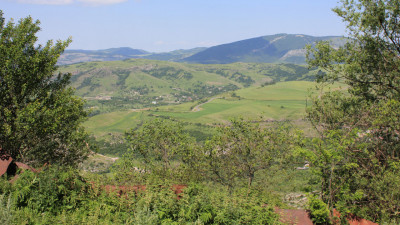
Image: A soldier back from the frontlines around Shusha (known as Shushi to Armenians) returns to his house to pack up and leave the region of Kelbajar, prior to its transfer back to Azerbaijani jurisdiction after the war. Credit: Jack Losh.
Contextualising the New Violence in a Long-Standing Dispute: October 2020
Laurence Broers joined Nina Caspersen and Thomas de Waal to discuss whether events in Nagorny Karabakh represented a shift from the previous political and strategic trendlines, and possible future trajectories.
Humanitarian crisis in and around Nagorny Karabakh: October 2020
This article for Chatham House focuses on the humanitarian catastrophe which unfolded in and around Nagorny Karabakh, aggravated by COVID-19 and the onset of winter.
Russia’s peace imposed on Armenia-Azerbaijan bloodshed: November 2020
In November 2020, Russia, Armenia and Azerbaijan signed a trilateral declaration to end the war in Nagorny Karabakh. But in this article for Chatham House, Laurence Broers argues that the declaration fails to resolve the issues at the core of the conflict.
Is Karabakh Going to Become like Abkhazia & South Ossetia? November 2020
Laurence Broers joins CivilNet to give his take on resolving the issue of the status of Nagorny Karabakh, as well as Russia securing its interests, the challenges facing Armenia and Azerbaijan, and the possibility of Nagorny Karabakh developing along the lines of South Ossetia.
The EU and Karabakh: Picking up the pieces, looking for a role: January 2021
Confronted with a major conflict in the body’s “Eastern Partnership” zone, the EU was able to do little during the Second Karabakh War other than issue statements of concern. But the EU could now contribute to making the emerging regional order more viable – and rebuilding trust with the parties.
Read Laurence Broers' article for Eurasianet.
Seeing beyond victory and defeat: pathways for Armenian-Azerbaijani relations after the second Karabakh war
The recent war has created a new and challenging landscape for any transformation of Armenian-Azerbaijani relations. These two articles explore the possible pathways confronting Armenia and Azerbaijan in the aftermath of war and their implications for long-term peace.
Read Laurence Broers' articles for Baku Dialogues and Analyticon.
Perspectives | The OSCE’s Minsk Group: A unipolar artifact in a multipolar world - May 2021
For 26 years, the Minsk Group of the Organization for Security and Co-operation in Europe (OSCE) worked fruitlessly to bring the Armenian-Azerbaijani conflict to a peaceful resolution. Then, in just six weeks, the Second Karabakh War radically altered the conflict and the Minsk Group was shunted aside. In this article for Eurasianet, Laurence Broers explores the reasons why diplomacy became so irrelevant to resolving the Armenian-Azerbaijani conflict.




